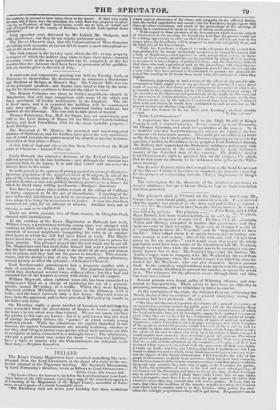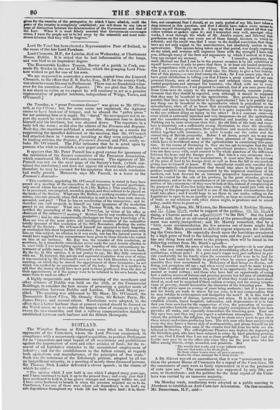The prisoners tried at el:Y. - Mild on time charge td . murdering
Mr, Cooper have been linind guilty, end sentenced to death. It m as proved that the murder was planned in the most cu, ii and deilberaie manner s IT" Weiland was to have been the victim, though Mr. Coope e John Ilyiti,lical‘Nle,ilv.11eonliida, was killed by 'flue principal e , Ryan Patrick, lied been treated harshly, as he said, try respecting the occupancy et' some land. He then, whit the prisoners,- Walsh and Hickey, conspired to murder that gel:item:In ; :lid they made no secret of their intention. Ryan said, ltc thought it wietel be a "good thing to shoot Mr. Weyland," and he "determined to have his life." They talked about it at public-houses, and to various per- sons, women as well as meth Otte of the witnesses :mid, " it had been going on fbr six months ; " and it would seem that nearly the whole populatiim must have heen aware of the intention to kill :V r. Weyland, though the exact time when the murder was to'be committed was pro- bably known but to few. 31m'. Samuel Cooper, and his brother, Mr. Austin Cooper, were in company With Weyland on the eieticfrom Kilmore to Tipperary when Mr. Austin Cooper was killed by slims in- tended for else Weyland ; who was also wounded. Several persons fired. In the immediate neighbourhood were numbers of the peasantry, not one of whom interfered to prevent the murder, or secure the actors in it. The witnesses for the prisoners swore through thick and thing but were not credited.
Several persons were found guilty of Whiteboy offences, and sen- tenced to transportation. There seems to have been no difficulty in procuring testimony, and no reluctance in juries to convict.
At the conclusion of' the trials, the Solicitor-General, addressing the Bench, do:lured that no evidence of a general conspiracy among the peasantry had been produced. lie said-
" We have not discovered a particle of evidence of a general conspiracy, or an organized association against the puldie peace; but on the contrary, those atrocities which have been committed, and into the circumstances Of which the legal authorities have yetto investigate. appear to be confined to a narrow circle—that they are confined hut to a compitrativedv small number of people. This, my Lor21,2, may involve the discussiou of topics of political and public importance, which I feel this is not a tit place to discuss; amid "hilt I implore of the people to abstain from erMie—while 1 beseeeli of than not to look to, or confide in, those who will hereafter bet rim;, theni—while I urge them to take the advice of the men to whose care their spiritual welfare is futile ted—yet I would implore most earnestly those to whom a good and gracious Providence has given an independence, to take eare that, in regardim: their owa liltereste, they do so with as little infraction on the comforts and it:2120122.2,s of their less 110-oared fellow men as is consdoent with the protection of their own rights. I might, my Lords, stop here, and I feel perhaps that I should do su ; but I am bound to allude to a matter which, in toy mind. appears to have a tendency to de- feat the objects of this Special Commission. I feel bound, tin' the sake of the people of this county, to allude to an assertion which has been made—namely, that thetlovernmelit of the country encourages eriall.—;1111.1 that whateveroffence the people may commit, they have only to apply to the Executive for pardon. Aly Lords, the prerogative of mercy is the hest :12221 mart valued privilege of the Crown—of the Sovereign, and those to whom the duty of that sivereign may be intrusted : but, while I admit that—while 1 state that no one values such a prerogative more than I do-1 warn time people against the belief that whatever crimes they may commit they will receive pardon. It is my ditty to Fitute, that when the condition of the country requires it—when distnemmiccs exist which lead to murder, such as in this instance, where justice has over- taken the unhappy perpetrators—they will be put down. No guarantee eau be
given for the exercise of the prerogative to which I have alluded, until the rue of the country is completely established; nor will there be one iota.ot bope of distinction between the determination of the Government and that of the Law. When it is most falsely asserted that Government encourages crime, I warn the people not to be led away by the miserable and most mon- strous delusion that they will be forgiven.'



























 Previous page
Previous page